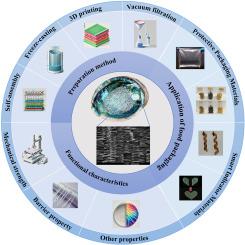珍珠启发的功能性生物材料:回顾其制备、表征及其在食品包装中的应用
IF 15.1
1区 农林科学
Q1 FOOD SCIENCE & TECHNOLOGY
引用次数: 0
摘要
背景几个世纪以来,珍珠层的形成、形态和特性一直吸引着科学家和工匠。珍珠质形成于软体动物的贝壳中,具有独特的层状复合结构,其特点是有机物质和碳酸钙晶体层交替排列。了解珍珠形成的复杂性,其意义远远超出了审美鉴赏。本文首先回顾了珍珠层的形成、结构和机械性能,旨在阐明如何将仿生功能材料组装起来用于食品应用。文章讨论了各种制造方法的潜力,包括模仿天然珍珠复杂结构的自组装、生物矿化、三维打印和真空过滤。主要发现和结论研究表明,受珍珠质启发的材料可以被制造成具有与天然珍珠相似的光学特性、机械强度、阻隔能力和疏水性。先进的制造技术可以精确控制这些材料的特性。因此,可以制造出新型生物启发材料,用于智能包装材料,如湿度传感器、新鲜度检测器或防伪标签,以提高食品质量、安全性和真实性。本文章由计算机程序翻译,如有差异,请以英文原文为准。

Pearl-inspired functional biomaterials: Review of their preparation, characterization, and application in food packaging
Background
The formation, morphology, and properties of the layers in pearl have intrigued scientists and artisans for centuries. Nacre, formed within the shells of mollusks, have a unique laminated composite structure, characterized by alternating layers of organic substances and calcium carbonate crystals. Understanding the intricacies of pearl formation has implications beyond aesthetic appreciation. Recently, there has been growing interest in exploring the potential applications of pearl-inspired materials in various fields, including the food industry.
Scope and approach
This article begins by reviewing the formation, structure, and mechanical properties of pearl layers, with the aim of elucidating how biomimetic functional materials can be assembled for food applications. The potential of various fabrication approaches, including self-assembly, biomineralization, 3D printing, and vacuum filtration for mimicking the complex structure of natural pearls are discussed. The potential application of these pearl-inspired biomimetic materials as protectants and sensors in food packaging is then highlighted.
Key findings and conclusions
Studies indicate that nacre-inspired materials can be fabricated to possess optical properties, mechanical strength, barrier capabilities, and hydrophobicity akin to those found in natural pearls. Advanced fabrication technologies allow precise control over the properties of these materials. As a result, novel bio-inspired materials can be created that may be used in smart packaging materials, e.g., as humidity sensors, freshness detectors, or anti-counterfeiting labels to enhance food quality, safety, and authenticity.
求助全文
通过发布文献求助,成功后即可免费获取论文全文。
去求助
来源期刊

Trends in Food Science & Technology
工程技术-食品科技
CiteScore
32.50
自引率
2.60%
发文量
322
审稿时长
37 days
期刊介绍:
Trends in Food Science & Technology is a prestigious international journal that specializes in peer-reviewed articles covering the latest advancements in technology, food science, and human nutrition. It serves as a bridge between specialized primary journals and general trade magazines, providing readable and scientifically rigorous reviews and commentaries on current research developments and their potential applications in the food industry.
Unlike traditional journals, Trends in Food Science & Technology does not publish original research papers. Instead, it focuses on critical and comprehensive reviews to offer valuable insights for professionals in the field. By bringing together cutting-edge research and industry applications, this journal plays a vital role in disseminating knowledge and facilitating advancements in the food science and technology sector.
 求助内容:
求助内容: 应助结果提醒方式:
应助结果提醒方式:


